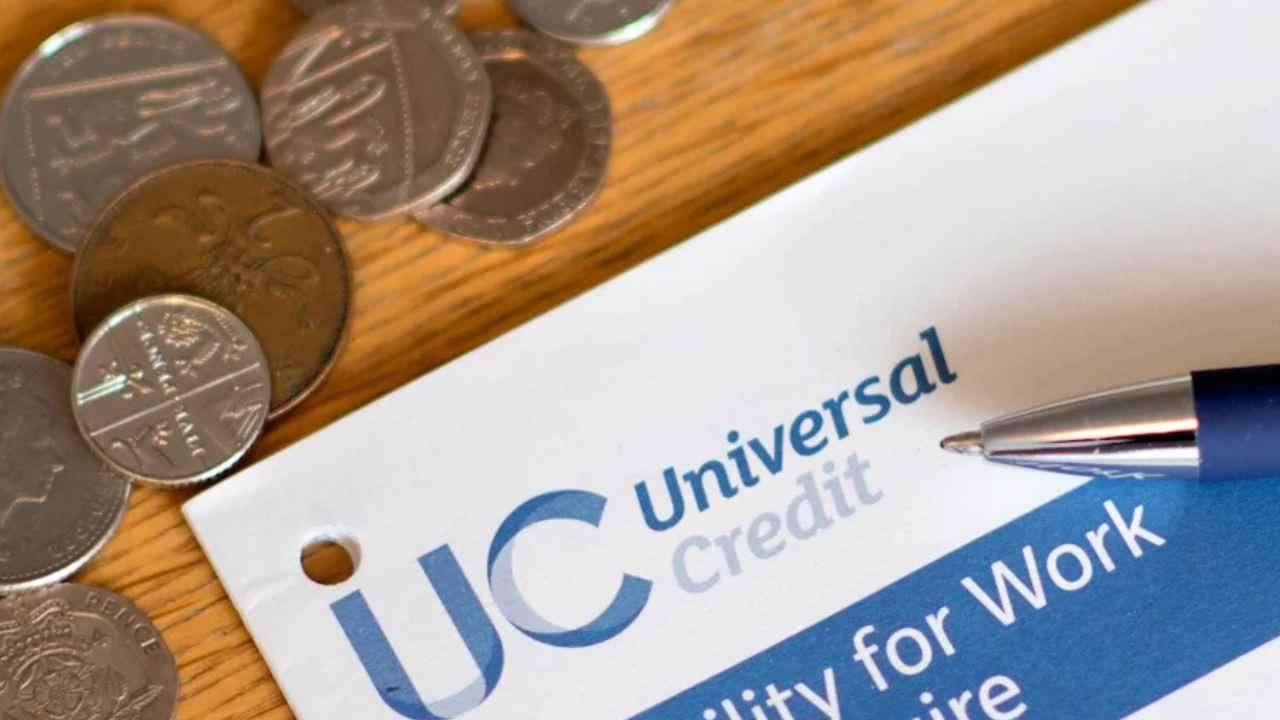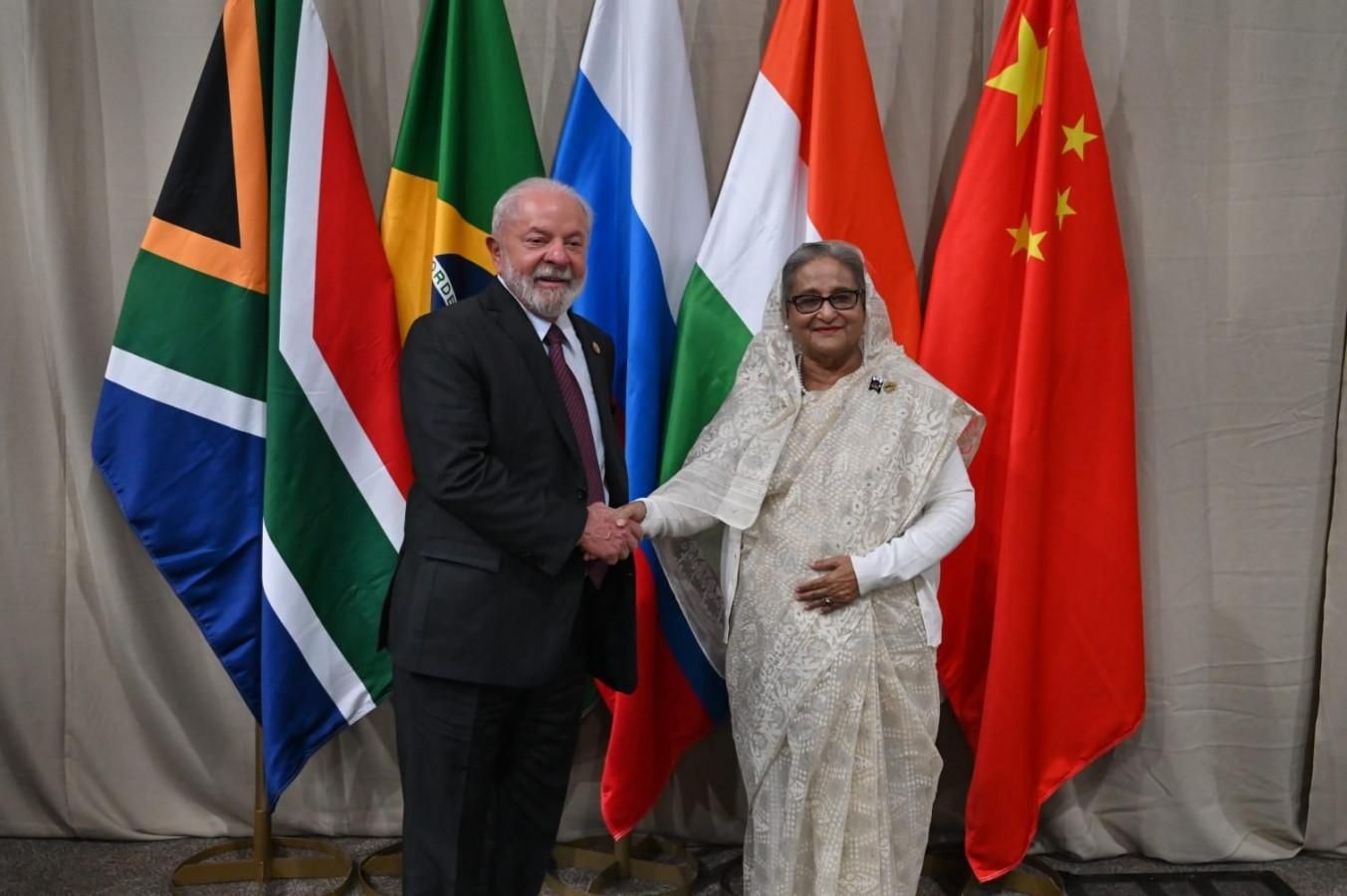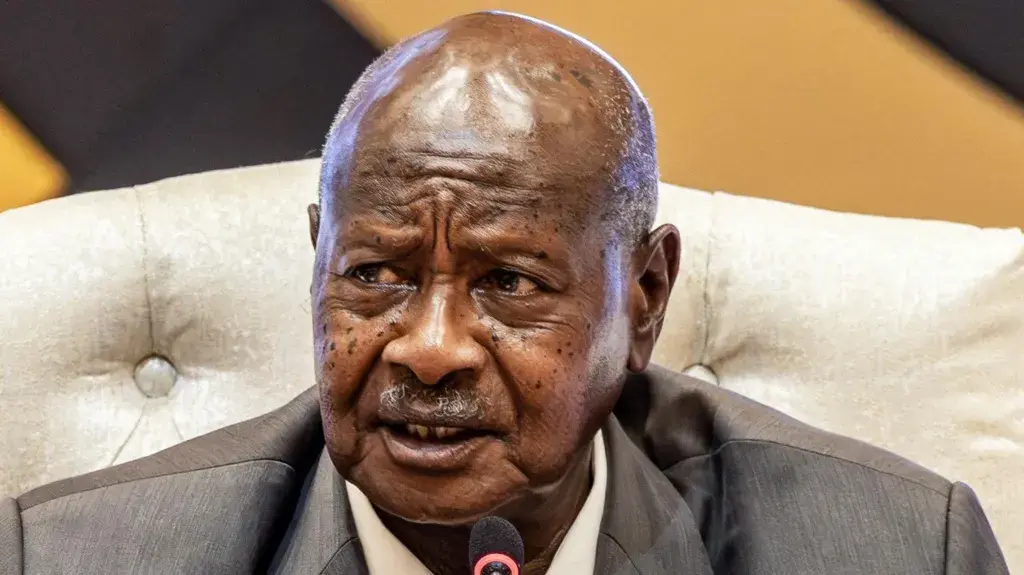Trade, investment, climate change, south–south cooperation, middle-east issue and inclusion of Bangladesh into BRICS are expected to dominate Bangladesh-Brazil state-level talks to be held in Brasilia this month.
Prime Minister of Bangladesh Sheikh Hasina is expected to visit Brazil later on July 24-26, 2024 at the invitation of Brazilian President Luiz Inácio Lula da Silva to deepen multilateral relations with the Latin American countries.
Brazilian Ambassador Paulo Fernando Dias Feres recently said Prime Minister Sheikh Hasina's visit to Brazil will be "bilateral" in nature.
Brazil, South America's most influential country, wants to strengthen its ties with Bangladesh on key fronts with a possible visit of Prime Minister Sheikh Hasina.
"This is a bilateral visit. It's just her. The idea is that she can launch with President Lula the global programme against hunger and then she will go to Brasilia for all the ceremonies of a full opera visit. So that's the idea," said Brazilian Ambassador Paulo Fernando Dias Feres while talking to diplomatic correspondents at "DCAB Talk" at Jatiya Press Club recently.
Brazil, the largest economy in South America, will leave no stone unturned to increase trade relations with Bangladesh as the latter has become a new economic giant in the South Asian region, said Brazil Ambassador to Bangladesh Paulo Fernandos Dias Feres.
This will be the first bilateral visit of the prime minister to any Latin American country which is seen as a rising economic power and one of the world's biggest democracies.
Brazil is planning to open a visa centre in Bangladesh to facilitate more people-to-people contact as the demand grows by the day.
Over the years, Brazil has become an important source of Bangladesh’s imports, mainly oil seeds and oleaginous fruits, animal or vegetable fats and oils and their cleavage products, sugars, cereals, iron and steel.
Brazil exported goods worth 2592.5 million US dollars and 2245.8 million US dollars to Bangladesh during 2022-2223 and 2021-22 fiscal years, according to the data of Bangladesh Bank.
Brazil was the fifth largest import source of Bangladesh in 2022-23 fiscal year with import recorded at 2592.5 million US dollars (3.80 per cent of total import). The total import of Bangladesh recorded at 68459.9 million US dollars, according to the data of Bangladesh Bank.
Brazil was the eighth largest import source of Bangladesh in 2021-22 fiscal year with import recorded at 2245.1 million (3.00 per cent of total import). The total import of Bangladesh recorded at 75,604.4 million US dollars, according to the data of Bangladesh Bank.
Bangladesh exported goods worth 175 million US dollars (175538064.3 US dollars) to Brazil as against its import of 2592.5 million US dollars making a trade gap of overt 2400 million US dollars.
Bangladesh exported goods worth 136609688.1 US dollars (136 million US dollars) during July-February period of the 2023-24 fiscal year to the Latin American country.
Meanwhile, Bangladesh’s export to Brazil, the largest market Latin America, during last 2022-23 fiscal year posted some 60 per cent growth over the previous 2021-22 fiscal year, according to data of the Export Promotion Bureau (EPB).
In the 2021-22 fiscal year, Bangladesh exported goods valued at $109.20 million to Brazil. The main products that Bangladesh exported to Brazil were Jerseys, pullovers, cardigans, waistcoats and similar articles; knitted or crocheted, shirts; men's or boys' (not knitted or crocheted), and suits, ensembles, jackets, blazers, trousers, bib and brace overalls, breeches and shorts (other than swimwear); men's or boys' (not knitted or crocheted).
During the 1995-2020 period, exports of Bangladesh to Brazil have increased at an annualized rate of 9.08 per cent, from $15.1 million in 1995 to $132 million in 2020.
In the 2021-22 fiscal year, Brazil exported goods valued $2,245.1 million US dollars to Bangladesh. The main products that Brazil exported to Bangladesh were cane or beet sugar and chemically pure sucrose, in solid form, cotton; not carded or combed, and soybeans, whether or not broken.
Shahidullah Azim, Managing Director of Classic Fashion Concept Ltd, a leading readymade garment exporter, said Bangladesh should start talks on signing FTA with major importing countries to maintain present export growth.
After LDC graduation in 2026, Bangladesh is likely to experience high tariff in major importing countries that may cut competitiveness and export of the country, Azim said.
Brazil imported textiles and clothing worth 5.9 billion US dollars in 2022. China was top exporter with 3476.1 million US dollars, followed by India with 317.7 million US dollars, Paraguay 230.3 million US dollars, USA with 156.3 million US dollars, Vietnam with 151.6 million, Bangladesh with 150.6 million and Indonesia with 138.1 million US dollars.
A top official of the commerce ministry while talking to this correspondent said that Bangladesh will explore pros and cons of exporting goods to Brazil market
Brazil is the fourth largest cotton producer and second top exporter while Bangladesh is the second largest cotton importer in the world.
Bangladesh and Brazil have increased their engagement in multilateral sectors especially in the trade and investment as the bilateral trade between the two countries marked a higher growth in recent times, he said.
Bangladesh has become a victim of climate change with thousands of citizens are at the risk of becoming refugees. Extreme hot weather has also hit hard the productivity of Bangladeshi workers. Immense carbon emission has posed a threat to the poor and developing countess. Brazil, an important member of BRICS, will discuss the issue in detail, sources in Dhaka and Brasilia.
Former Foreign Minister Dr AK Abdul Momen last year said Bangladesh is keen to join BRICS, an economic bloc of five countries - Brazil, Russia, India, China and South Africa, if the platform invites Bangladesh.
"We will surely join if they invite us. BRICS leaders are thinking of taking eight emerging economies, including Saudi Arabia, United Arab Emirates, Bangladesh and Indonesia," he said.
Dr AK Abdul Momen said Bangladesh has already become a member of the BRICS New Development Bank.
"We want more money from different sources. If they (BRICS) invite us .. I think we will welcome it," he said.
Dr Momen said the current global economic crisis is inducing countries to cooperate more on regional and multilateral platforms.
Sources said that Bangladesh will urge Brazil to reduce the widening trade gap during official talks between the two countries
Meanwhile, Foreign Minister of Bangladesh Dr Hasan Mahmud held a meeting Brazilian Foreign Minister Mauro Vieira during the later’s visit to Bangladesh on April 7-8, 2024.
The Brazil FM led a 24-member business delegation to Dhaka during their visit to Dhaka and held meetings with a delegation of FBCCI, the apex trade body of the country.
As Bangladesh has become an emerging economy in the region and has maintained a steady economic growth over years defying the corona pandemic, Brazil’s President Luiz Inácio Lula da Silva has decided to expand multilateral engagements especially in the trade and investment with the South Asian country, diplomatic sources.
As part of that strategy, a high-powered trade delegation of the Latin American country visited Bangladesh in May in 2023 with an aim to strengthen bilateral trade with Bangladesh.
Meanwhile, the Embassy of Brazil in Dhaka in cooperation with the Ministry of Foreign Affairs of Brazil, Department of Trade Promotion, Investment Attraction (DPRA) and Agribusiness in Brazil (Apex-Brazil) and Brazil-Bangladesh Chamber of Commerce and Industry (BBCCI) held a conference titled Brazil-Bangladesh Trade Conference in the city in May, 2023.
Bangladesh’s economy has been growing steadily over the years and is now the 41st largest economy in the world, according to new data of the International Monetary Fund (IMF).
Meanwhile, the International Monetary Fund (IMF) has revised its Gross Domestic Product (GDP) forecast for Latin America by one tenth upwards in 2024, estimating an economic expansion of 2% in the region, compared to the 1.9% published last January.
In 2025, Latin America would grow by 2.5%, the same than expected in January. At that time, the forecast for 2025 improved by one tenth, while the estimate for 2024 fell and has not yet recovered since the levels expected in October 2023.
In its 'World Economic Outlook' presented this Tuesday in Washington, the IMF affirms that the risks to global outlook are now "quite balanced", although it warns the threat of inflation derived from geopolitical tensions, such as the war in Ukraine and the situation in the Middle East.
Brazil and Mexico, the region's largest economies, will have positive performance this year, helping the improvement in the region forecast. South American economies will also improve better than expected earlier.
Compared to last January's forecast, when Brazil was expected to grow by 1.7%, the IMF now projects that it to expand by 2.2%. In 2025, Brazilian GDP would grow 2.1%, two tenths more than the forecast.
However, the projections for Mexico have been revised downwards. Growth of 2.4% is now estimated, which is three tenths less than in January's report. In 2025, the estimate is 1.4%, one tenth less.
For its part, the Peruvian economy will grow 2.5% this year and 2.7% in 2025. Meanwhile, Argentina's economy is projected to fall 2.8% and inflation will accumulate 150%, with a marked rebound expected for 2025 amid a strong inflationary slowdown.
The multilateral organization highlights that as regards to South America, Uruguay (3.7%), Peru (2.5%) and Colombia (1.1%) would improve their performance compared to 2023 figures, whereas Venezuela will experience the highest growth (4%), followed by Paraguay (3.8%), Brazil (2.2%), Chile (2%), Bolivia (1.6%), Ecuador (0.1%) and Argentina (-2.8%).
“Except Argentina, there is no South American country that appears negative this year,” highlighted the IMF.








.svg)

